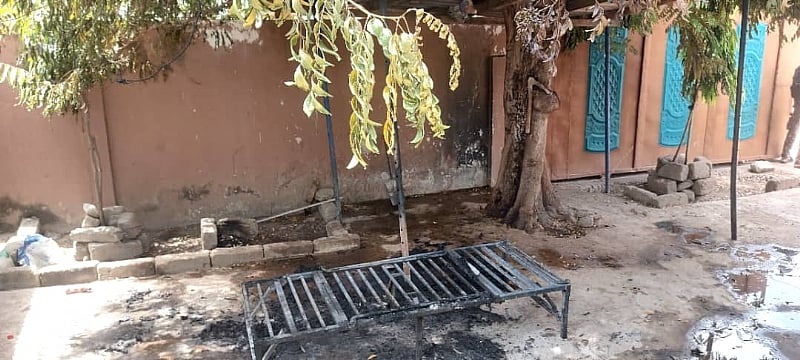The Bawku chieftaincy conflict, a protracted and deeply rooted dispute, has once again erupted in violence, targeting the private residences of prominent figures in the region. On Thursday, April 10, 2025, the home of Hajia Laadi Ayii Ayamba, the Member of Parliament for the Pusiga constituency, came under attack by armed men. The assailants, described as irate youth, stormed the property firing gunshots and causing damage to the doors and windows. A mattress and bed within a summer hut typically used by security personnel were set ablaze. Though no casualties were reported, the attack signals a dangerous escalation of tensions in the already volatile Bawku area. This incident follows closely on the heels of another attempted attack on the private residence of Mahama Ayariga, the MP for Bawku Central Constituency, which, fortunately, proved unsuccessful. While the motives behind these attacks remain unclear, the timing suggests a direct link to the ongoing chieftaincy dispute.
The attack on Hajia Ayamba’s residence appears to be retaliatory, stemming from a violent clash between police and a group of youth affiliated with one of the factions involved in the chieftaincy conflict. This clash, occurring on Wednesday, April 9, 2025, resulted in the death of a civilian, Fuseini Iddrisu, and significant property damage. The police barracks were set on fire, along with a police vehicle and the private residences of three police officers, including that of Assistant Commissioner of Police Adamu Seidu, the Bawku Divisional Police Commander. The escalating violence also resulted in injuries to a police officer, an immigration officer, and several civilians, all of whom are currently receiving medical treatment. The targeting of both political figures and law enforcement officials highlights the dangerous trajectory of the conflict and the increasing vulnerability of those perceived to be aligned with either side of the dispute.
The recent surge in violence underscores the complex and deeply entrenched nature of the Bawku chieftaincy conflict. The dispute, which has simmered for decades, revolves around the chieftaincy title and the associated power and influence. The two main factions, each claiming legitimacy, have engaged in intermittent clashes, often resulting in loss of life and property. The involvement of youth, as witnessed in the recent attacks, further complicates the situation, adding an unpredictable and volatile element to the already tense environment. The targeting of security personnel and their properties indicates a growing disregard for law and order and a willingness to escalate the conflict despite the presence of law enforcement.
The Ghana Police Service and other security agencies are working to restore calm and order in the region, intensifying their presence and efforts to de-escalate the situation. However, their presence has also become a point of contention, with some perceiving them as biased towards one faction or another. The police have publicly urged the feuding factions to resolve their differences peacefully and to refrain from involving security forces in their dispute. They have emphasized their role as protectors of life and property, not as mediators in the chieftaincy conflict. This appeal highlights the delicate balancing act faced by security forces – maintaining order while simultaneously avoiding being perceived as taking sides in the complex and deeply emotional chieftaincy dispute.
The attacks on the residences of the two MPs represent a worrying development in the Bawku conflict. They signify a broadening of the conflict beyond traditional lines and an increasing willingness to target individuals perceived as influential, regardless of their formal role in the chieftaincy dispute. This expansion of the conflict zone, coupled with the increasing disregard for law enforcement, presents a significant challenge to the authorities and threatens to further destabilize the region. The targeting of political figures suggests an attempt to exert pressure and influence the political landscape, potentially adding another layer of complexity to the already intricate conflict dynamics.
Addressing the underlying causes of the Bawku chieftaincy conflict is crucial for achieving lasting peace and stability in the region. While security interventions are essential for containing the immediate violence, a long-term solution requires addressing the root causes of the dispute. This involves engaging all stakeholders in a constructive dialogue aimed at finding a mutually acceptable resolution to the chieftaincy issue. Furthermore, promoting reconciliation and fostering a culture of peaceful coexistence within the community are vital for healing the wounds of the past and preventing future outbreaks of violence. The involvement of traditional authorities, religious leaders, and civil society organizations is crucial in facilitating these processes and building trust among the different factions. Ultimately, a sustainable solution requires a holistic approach that addresses both the immediate security concerns and the underlying socio-political factors fueling the conflict.














